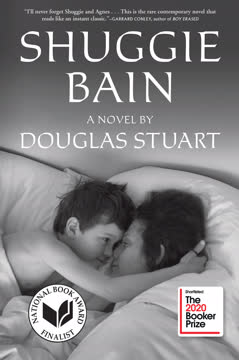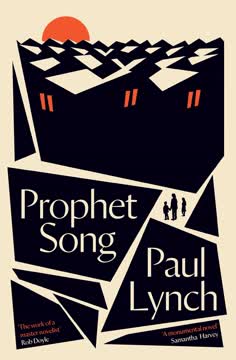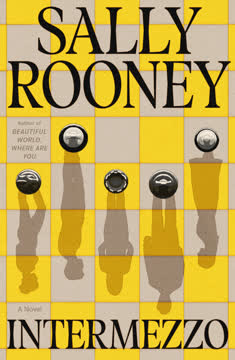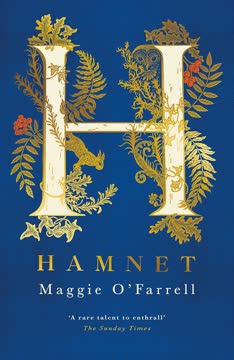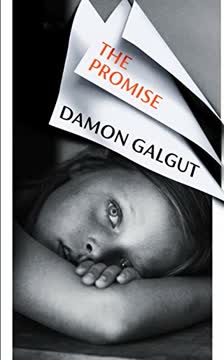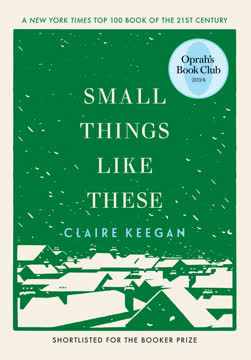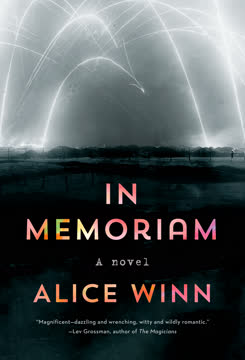Plot Summary
Shuggie's Lonely Routine
In 1992, Shuggie Bain, now a teenager, lives alone in a small Glasgow bedsit, working at a deli counter and dreaming of a better life. His days are marked by routine and isolation, haunted by memories of his mother, Agnes, and the relentless poverty and addiction that shaped his childhood. Shuggie's meticulous habits—arranging food displays, counting coins, and keeping his space tidy—are small acts of control in a world that has always felt precarious. He is surrounded by other lonely men, each lost in their own struggles, and finds fleeting comfort in the company of older women at work, though their attention is often predatory or pitying. Shuggie's longing for connection and hope for a different future are ever-present, but the weight of his past and the stigma of his circumstances make escape seem impossible.
Agnes's Velvet Dreams
Flashback to 1981: Agnes Bain, Shuggie's mother, is a striking woman trapped in a suffocating Glasgow high-rise with her parents, husband, and three children. She dreams of a life of beauty, romance, and excitement, far from the drabness and judgment of her surroundings. Agnes's charm and vanity set her apart, but also isolate her. Her marriage to Shug Bain, a charismatic but selfish taxi driver, is already unraveling. Agnes's attempts to assert control—through shopping, socializing, and maintaining her appearance—mask her growing dissatisfaction and sense of failure. The women around her, once her friends, now serve as a chorus of cautionary tales, their own lives marked by disappointment and resignation.
Family Fractures Deepen
Shug's infidelities and emotional distance push Agnes further into despair. The family's move from Agnes's parents' home to a promised better life in a new house quickly reveals itself as another disappointment. Shug abandons Agnes and the children in a bleak mining village, Pithead, leaving her to fend for herself. The children—Catherine, Leek, and young Shuggie—are forced to adapt to new schools, poverty, and the hostility of neighbors. Agnes's drinking escalates as her dreams of love and stability crumble. The children, especially Leek and Catherine, begin to distance themselves emotionally, seeking their own forms of escape.
Dancing in the Fire
Despite her decline, Agnes and Shuggie share moments of intimacy and joy, often centered around music and dancing. These fleeting episodes of connection are shadowed by Agnes's alcoholism and the ever-present threat of violence, neglect, and humiliation. Shuggie becomes his mother's caretaker, learning to read her moods, hide her drinking, and protect her from herself and others. The outside world—school, neighbors, and even extended family—offers little refuge, and Shuggie's difference (his sensitivity, effeminacy, and loyalty to Agnes) makes him a target for bullying and scorn.
The Move to Pithead
The family's relocation to Pithead, a dying mining community, is meant to be a fresh start but quickly becomes a trap. The neighbors are suspicious and hostile, and Agnes's attempts to fit in are met with ridicule and exclusion. Shug's abandonment is final; he starts a new family, leaving Agnes with mounting debts and no support. The children's lives are shaped by deprivation, shame, and the constant threat of social services intervention. Agnes's drinking becomes the center of the household, dictating the rhythms of daily life and the children's survival strategies.
Agnes's Descent Begins
Agnes's alcoholism deepens, fueled by loneliness, poverty, and the relentless judgment of others. She cycles through periods of hope and resolve—attending AA meetings, finding work, and promising her children a better future—only to relapse again and again. The community's women, themselves hardened by hardship, alternately enable and ostracize her. Shuggie's world narrows to the confines of their home and his mother's moods. He becomes adept at managing her drinking, hiding money, and fending off predatory men and manipulative neighbors.
The Neighbors' Judgment
The women of Pithead, led by figures like Bridie and Colleen, police the boundaries of respectability and punish those who fall short. Agnes, with her beauty, pride, and difference, becomes a scapegoat for their own frustrations. Gossip, exclusion, and outright hostility are daily realities. Shuggie, marked by his mother's reputation and his own perceived queerness, is bullied and isolated at school and in the neighborhood. The family's poverty and Agnes's addiction are both cause and consequence of their social exile.
Shuggie's Isolation Grows
As Agnes's drinking worsens, Shuggie's world contracts. He is increasingly alone, both at home and outside. His attempts to make friends are thwarted by his reputation and his own awkwardness. He is bullied for being "different"—too soft, too well-spoken, too devoted to his mother. Even within his family, he is left behind: Catherine escapes through marriage and emigration, Leek through withdrawal and eventual departure. Shuggie's love for Agnes, and his hope that she will recover, become both his anchor and his prison.
Leek's Quiet Escape
Leek, Shuggie's older half-brother, is a quiet, artistic boy who bears the brunt of the family's burdens. He is Agnes's son from her first marriage, and his paternity is a source of unspoken tension. Leek's talent for drawing and his gentle nature set him apart, but he is also marked by poverty and neglect. As Agnes's drinking worsens and the family's situation deteriorates, Leek withdraws further, eventually leaving home to seek work and a life of his own. His departure is both a relief and a loss for Shuggie, who is left as Agnes's sole caretaker.
Agnes's Last Chances
There are moments when Agnes seems poised to recover: she finds work at a gas station, attends AA, and even begins a tentative romance with Eugene, a kind taxi driver. For a time, the household stabilizes, and Shuggie experiences a semblance of normalcy—school, friends, and hope for the future. But the weight of the past, the pull of addiction, and the scars of poverty and trauma are too great. Agnes's relapses become more frequent and severe, and the brief interlude of happiness is lost.
Shuggie's Coming of Age
As he enters adolescence, Shuggie is forced to confront the limits of his love and loyalty. He is increasingly aware of his own sexuality and difference, and the dangers they pose in a hostile environment. His mother's decline accelerates, and he is left to manage the household, fend off predatory adults, and navigate the treacherous world of school and work. The loss of his siblings, the betrayal of neighbors, and the indifference of institutions leave him with few options. Shuggie's resilience and capacity for hope are tested to their limits.
Agnes's Final Fall
Agnes's final decline is marked by failed attempts at sobriety, mounting debts, and increasing isolation. Her health deteriorates, and she is hospitalized after a suicide attempt. Shuggie, now almost entirely alone, is forced to place her in the care of others and eventually to witness her death. The loss is devastating, but also brings a measure of release. Shuggie is left to mourn not only his mother, but the life they might have had, and to reckon with the legacy of love, pain, and endurance she leaves behind.
Shuggie Alone
In the aftermath of Agnes's death, Shuggie is left to navigate the world on his own. He finds work, maintains his routines, and seeks connection where he can. The scars of his childhood—poverty, addiction, loss, and difference—remain, but so does his capacity for love and hope. The novel ends with Shuggie reaching out to a friend, Leanne, another child of an alcoholic, as they share a moment of understanding and solidarity. Shuggie's future is uncertain, but his resilience and refusal to give up offer a glimmer of possibility.
Characters
Shuggie Bain
Shuggie is the youngest child of Agnes Bain, growing up in 1980s Glasgow amid poverty, addiction, and social stigma. Marked by his effeminacy, sensitivity, and unwavering devotion to his mother, Shuggie is both a caretaker and a victim. His loyalty to Agnes is both his greatest strength and his deepest wound, as he sacrifices his own childhood and well-being in the hope of saving her. Shuggie's difference makes him a target for bullying and isolation, but also endows him with a capacity for empathy and endurance. Over the course of the novel, he is forced to confront the limits of love, the pain of loss, and the challenge of forging an identity in a hostile world. His journey is one of survival, self-discovery, and the search for dignity.
Agnes Bain
Agnes is a woman of striking beauty and pride, whose dreams of glamour and escape are crushed by poverty, betrayal, and addiction. Her marriage to Shug Bain is marked by disappointment and abuse, and her attempts to assert control—through appearance, shopping, and socializing—mask a deep sense of failure and longing. Agnes's alcoholism is both a symptom and a cause of her decline, and her relationship with her children, especially Shuggie, is fraught with love, dependence, and pain. She is both victim and perpetrator, capable of great tenderness and devastating cruelty. Agnes's struggle is emblematic of the broader social and economic forces that shape the lives of the poor, and her ultimate fate is a testament to the destructive power of addiction and the resilience of those who love her.
Shug Bain
Shug is a taxi driver whose charisma and confidence mask a deep selfishness and inability to commit. He is the catalyst for much of Agnes's suffering, abandoning her and their children for other women and leaving them to face poverty and social ostracism. Shug's presence in the novel is both literal and symbolic: he is the embodiment of false promises, fleeting pleasure, and the destructive allure of escape. His relationship with Shuggie is distant and transactional, marked by disappointment and unmet needs. Shug's actions set in motion the family's decline, and his absence haunts the lives of those he leaves behind.
Leek Bain
Leek is Agnes's son from her first marriage, a gentle and talented boy whose artistic gifts and sensitivity set him apart. He bears the brunt of the family's burdens, often acting as a surrogate parent to Shuggie and a buffer between Agnes and the world. Leek's withdrawal and eventual departure are acts of self-preservation, but also leave Shuggie more vulnerable. His relationship with Shuggie is marked by love, frustration, and a shared understanding of their mother's pain. Leek's journey is one of quiet endurance and the search for a life beyond survival.
Catherine Bain
Catherine is Agnes's daughter from her first marriage, a pragmatic and determined young woman who seeks escape through work, marriage, and emigration. Her relationship with Agnes is strained by resentment and guilt, and her departure is both an act of self-preservation and a source of lasting regret. Catherine's absence leaves Shuggie and Leek more exposed, and her attempts to build a better life are shadowed by the legacy of her family's struggles.
Eugene McNamara
Eugene is a taxi driver who becomes Agnes's lover during a period of attempted sobriety. He offers stability, kindness, and the possibility of a new life, but is ultimately unable to overcome the challenges of Agnes's addiction and the weight of her past. His relationship with Agnes is marked by genuine affection, but also by misunderstanding and the limits of good intentions. Eugene's presence offers a glimpse of what might have been, but his eventual withdrawal is another in a series of losses for Agnes and Shuggie.
Colleen McAvennie
Colleen is one of the women of Pithead who polices the boundaries of respectability and enforces conformity through gossip, exclusion, and cruelty. Her antagonism toward Agnes is rooted in both envy and fear, and her actions reflect the broader dynamics of social control and survival in a marginalized community. Colleen's relationship with Agnes is a microcosm of the novel's themes of judgment, solidarity, and the destructive power of shame.
Bridie Donnelly
Bridie is another key figure in the Pithead community, a matriarch who both enables and enforces the social order. She is a source of practical support and advice, but also participates in the ostracism and punishment of those who fall short. Bridie's interactions with Agnes and Shuggie reveal the complexities of female solidarity and the ways in which poverty and hardship can breed both compassion and cruelty.
Jinty McClinchy
Jinty is one of Agnes's drinking companions, a woman whose own struggles with addiction and loneliness make her both a source of comfort and a dangerous influence. Her relationship with Agnes is marked by mutual need, enabling, and occasional betrayal. Jinty's presence in the novel highlights the ways in which addiction creates and destroys bonds, and the difficulty of breaking free from destructive patterns.
Leanne Kelly
Leanne is a girl from Shuggie's later years, herself the child of an alcoholic mother. Her friendship with Shuggie is based on shared experience, mutual understanding, and a refusal to give in to despair. Leanne's resilience and pragmatism offer a counterpoint to Shuggie's loyalty and hope, and their bond is a source of solace and possibility in an otherwise bleak world.
Plot Devices
Cyclical Structure and Generational Trauma
The novel's structure is cyclical, moving between past and present, and mirroring the repetitive nature of addiction, poverty, and familial dysfunction. The story is told through a series of vignettes and flashbacks, each illuminating a different aspect of the Bain family's decline and the forces that shape their lives. The use of recurring motifs—dancing, drinking, moving house, and the search for normalcy—underscores the inescapability of certain patterns and the difficulty of breaking free. The generational transmission of trauma, shame, and resilience is a central theme, as each character struggles to forge a different path while being pulled back by the weight of the past.
Social Realism and Intimate Perspective
Douglas Stuart employs a style of social realism, offering an unvarnished portrayal of 1980s Glasgow and the lives of its working-class residents. The narrative is deeply intimate, filtered through Shuggie's perspective, which combines innocence, sensitivity, and a growing awareness of the world's harshness. The use of dialect, detailed descriptions of daily life, and the focus on small acts of care and survival create a sense of authenticity and immediacy. The novel's realism is both a source of pain and a testament to the dignity and endurance of its characters.
Foreshadowing and Symbolism
Throughout the novel, Stuart uses foreshadowing and symbolism to build tension and deepen meaning. The recurring imagery of fire, water, and dancing serves as both literal and metaphorical markers of transformation, destruction, and hope. The breaking of cherished objects, the repetition of certain phrases, and the cyclical nature of Agnes's relapses all point toward the inevitability of loss and the possibility of renewal. The novel's ending, with Shuggie reaching out to Leanne, is both a callback to earlier moments and a gesture toward an uncertain but hopeful future.
Analysis
Shuggie Bain is a devastating and tender exploration of the bonds between mother and son, the corrosive effects of poverty and addiction, and the struggle to maintain dignity and hope in the face of relentless adversity. Douglas Stuart's novel is both a social document and a deeply personal story, capturing the textures of working-class Glasgow with empathy and precision. The characters are drawn with psychological depth and complexity, their flaws and strengths rendered in equal measure. The novel's central lesson is the endurance of love—however imperfect, however painful—and the possibility of survival even when rescue seems impossible. Shuggie's journey is a testament to the resilience of the human spirit, the costs of loyalty, and the necessity of forging one's own path. In the end, the novel offers no easy answers, but insists on the value of compassion, understanding, and the refusal to give up on oneself or others.
Last updated:
FAQ
0. Synopsis & Basic Details
What is Shuggie Bain about?
- A Son's Unwavering Love: Shuggie Bain is a poignant narrative centered on Hugh "Shuggie" Bain, a young boy growing up in 1980s Glasgow, Scotland, who dedicates his childhood to caring for his mother, Agnes, as she battles severe alcoholism. The story explores their intense, often destructive, bond against a backdrop of Thatcher-era poverty and social decay.
- Struggle for Dignity: The novel vividly portrays the Bain family's relentless struggle for survival and dignity in a harsh environment, marked by unemployment, sectarianism, and the crushing weight of societal judgment. It follows their moves between different working-class neighborhoods, each offering fleeting hope before succumbing to the same cycle of despair.
- Coming-of-Age in Adversity: Beyond Agnes's addiction, the book is a powerful coming-of-age story for Shuggie, who grapples with his burgeoning identity, effeminacy, and isolation, all while navigating the complexities of his family's fractured relationships and the unforgiving world around him.
Why should I read Shuggie Bain?
- Deep Emotional Resonance: Readers should delve into Shuggie Bain for its raw, unflinching emotional honesty and its profound exploration of unconditional love amidst unimaginable hardship. It offers a deeply moving portrayal of a child's devotion and the devastating impact of addiction on a family.
- Rich Cultural Immersion: The novel provides a vivid, immersive experience of working-class Glasgow in the 1980s, capturing the unique dialect, social dynamics, and economic struggles of the era. It's a powerful piece of social realism that transports the reader directly into its setting.
- Literary Acclaim: As a Booker Prize winner, Shuggie Bain is recognized for its exceptional literary merit, masterful storytelling, and unforgettable characters. It's a challenging but ultimately rewarding read that leaves a lasting impression.
What is the background of Shuggie Bain?
- Thatcher-Era Glasgow: The novel is set in Glasgow during the 1980s, a period profoundly impacted by Margaret Thatcher's conservative government policies. This era saw the decline of heavy industries like shipbuilding and coal mining, leading to mass unemployment, widespread poverty, and a surge in social issues, including drug and alcohol addiction, which form the grim backdrop of the Bain family's life.
- Sectarian Divide: While not explicitly central, the underlying sectarian tensions between Catholics and Protestants in Glasgow subtly influence character interactions and social divisions. Agnes's marriage to Shug, a Protestant, after leaving her Catholic first husband, Brendan, highlights these societal fault lines and the judgment that often accompanied them.
- Author's Personal History: Douglas Stuart drew heavily from his own childhood experiences growing up in Glasgow with an alcoholic mother. This autobiographical element lends the narrative an intense authenticity and emotional depth, making the portrayal of Agnes and Shuggie's relationship particularly visceral and heartbreaking.
What are the most memorable quotes in Shuggie Bain?
- "You'll not remember the city, son. You were too wee. But there were dance halls, all kinds, and big shops. You could be out all the time because there was always something to do." (Chapter 27): This quote encapsulates Agnes's yearning for a lost past and a better life, a romanticized vision of Glasgow that contrasts sharply with their grim reality. It highlights her persistent hope, even when her circumstances offer none, and her desire for Shuggie to experience a world she can no longer access.
- "I decided long ago never to walk in anybody's shadow. If I fail, if I succeed, at least I'll live as I believe. No matter what you take from me. You can't take away my dignity." (Chapter 9): Sung by Shuggie, this Whitney Houston lyric becomes his personal anthem of resilience and self-assertion. It powerfully articulates his deep-seated need for dignity and autonomy, even as he navigates a life where both are constantly threatened, foreshadowing his eventual break from his mother's shadow.
- "Sometimes you don't even want something. You just can't stand for someone else to have it." (Chapter 24): Agnes delivers this cutting observation to Shug, revealing a core aspect of her own and others' motivations. It speaks to the pervasive envy and scarcity mentality born of poverty, where the desire to possess is often overshadowed by the inability to tolerate another's perceived good fortune, even if it's something one doesn't truly want.
What writing style, narrative choices, and literary techniques does Douglas Stuart use?
- Immersive Dialect and Sensory Detail: Stuart masterfully employs the Glaswegian dialect, immersing the reader in the characters' world through authentic dialogue and internal monologue. His prose is rich with sensory details—the smell of stale beer, the feel of damp clothes, the sight of peeling wallpaper—creating a visceral and often uncomfortable realism.
- Shifting Perspectives and Focalization: While primarily focalized through Shuggie, the narrative frequently shifts to Agnes's perspective, offering deep insight into her internal struggles, desires, and delusions. This dual perspective allows for a complex, empathetic portrayal of both characters, highlighting their individual pains and their intertwined fates.
- Symbolism and Recurring Motifs: Stuart weaves a tapestry of recurring symbols and motifs, such as fire (representing destruction and fleeting beauty), water (for cleansing, drowning, and escape), and the constant presence of mirrors and reflections (for self-perception and distorted reality). These elements deepen the thematic resonance and foreshadow key emotional and plot developments.
1. Hidden Details & Subtle Connections
What are some minor details that add significant meaning?
- Shuggie's Meticulous Habits: From carefully arranging deli meats to organizing coins by shine, Shuggie's compulsive tidiness (Chapter 1) is a profound coping mechanism. It signifies his desperate attempt to impose order and control on a chaotic life, a stark contrast to Agnes's unraveling, and foreshadows his later self-sufficiency.
- The "Cross Your Heart" Bra: Agnes's excitement over the "Cross Your Heart" bra (Chapter 2) is more than vanity; it's a symbol of her longing for an idealized, uplifted self, both physically and emotionally. The bra's promise of transformation reflects her deeper desire to escape her drab reality and reclaim a lost sense of glamour and desirability.
- Leek's Hidden Art: Leek's secret drawings of fantastical creatures and architectural blueprints (Chapter 5) are a subtle but powerful indicator of his inner world and artistic escape. These hidden talents represent his suppressed potential and his quiet rebellion against the grim reality of Pithead, a stark contrast to his outward passivity.
What are some subtle foreshadowing and callbacks?
- Agnes's "Flying" Moment: In Chapter 2, Agnes leans out her high-rise window, feeling like she "flew" for a brief moment, then considers leaning further, thinking it would be "so easy to trick herself." This subtly foreshadows her later suicide attempt by gas and her eventual death by stepping in front of a bus, hinting at her recurring desire for escape and self-destruction.
- The Broken Porcelain Figurines: Shuggie's meticulous care for Agnes's porcelain figurines, and his distress when they break (Chapter 32), mirrors his attempts to hold together his mother's fragile life and his own fractured sense of self. The broken cervatilla and apple seller symbolize the irreparable damage inflicted by their circumstances and Agnes's decline.
- Shug's Masonic Ring: Shug's Masonic ring, often mentioned in passing (e.g., Chapter 2, 7), subtly hints at his connections and influence beyond the family, explaining his ability to secure housing or jobs, however fleeting. It also symbolizes a secret, exclusive world from which Agnes and the children are excluded, underscoring his ultimate detachment and selfishness.
What are some unexpected character connections?
- Agnes and Colleen McAvennie's Shared Vulnerability: Despite their bitter rivalry and Colleen's judgment, Agnes and Colleen McAvennie share a moment of raw vulnerability (Chapter 14) when Colleen's husband leaves. Agnes, despite her initial schadenfreude, cradles Colleen, recognizing a shared pain of abandonment and the destructive power of male infidelity, revealing a deeper, unspoken solidarity beneath their animosity.
- Shuggie and Leanne Kelly's Parallel Lives: Shuggie's friendship with Leanne Kelly (Chapter 18) is built on an unspoken understanding of their shared experience as children of alcoholic mothers. Their conversations, particularly about their mothers' relapses and coping mechanisms, reveal a profound, almost telepathic connection that transcends typical adolescent friendships, highlighting the isolating yet unifying nature of their trauma.
- Eugene McNamara's Past Addiction: Eugene's revelation that he is a recovering alcoholic (Chapter 11) is an unexpected connection that deepens his character and explains his initial reluctance to drink with Agnes. This shared history of struggle, though initially hidden, forms a fragile bridge between them, offering Agnes a glimpse of a different path, even if she ultimately cannot take it.
Who are the most significant supporting characters?
- Leek Bain: Shuggie's older half-brother, Leek, is a quiet, artistic soul whose silent suffering and eventual escape profoundly impact Shuggie. His artistic talent and introverted nature make him an observer, often bearing the brunt of Agnes's moods. His departure leaves Shuggie as Agnes's sole caretaker, intensifying Shuggie's burden and isolation.
- Lizzie Campbell (Agnes's Mother): Lizzie, Agnes's mother, represents a generation hardened by hardship but clinging to traditional values and Catholic faith. Her pragmatic love for Agnes is often expressed through harsh judgment, yet she provides a crucial, albeit flawed, safety net for the family. Her death marks a significant turning point, removing Agnes's last stable anchor.
- Eugene McNamara: Eugene, Agnes's kind and hopeful suitor, offers a brief but potent glimpse of a potential escape from her destructive cycle. His genuine affection and attempts to support her sobriety highlight the possibility of redemption, making his eventual departure due to Agnes's relapse all the more tragic and impactful on Shuggie.
2. Psychological, Emotional, & Relational Analysis
What are some unspoken motivations of the characters?
- Agnes's Pursuit of Validation: Agnes's relentless focus on her appearance, her shopping sprees, and her desire for male attention (Chapter 2) are unspoken attempts to validate her self-worth, which has been eroded by poverty, societal judgment, and Shug's neglect. Her beauty is her currency, a desperate bid for control and recognition in a world that otherwise renders her invisible.
- Shug's Need for Control and Escape: Shug's frequent infidelities and his abandonment of Agnes (Chapter 3) are driven by an unspoken need for control and escape from the responsibilities of family life and the emotional demands of Agnes's addiction. His charm is a tool to maintain superficial relationships, allowing him to avoid genuine intimacy and the consequences of his actions.
- Leek's Artistic Retreat: Leek's quiet withdrawal and dedication to drawing (Chapter 5) are an unspoken form of self-preservation. His art provides an escape from the chaos of his home life and a way to process his emotions, serving as a silent protest against the harsh realities he cannot change. This artistic pursuit is his way of maintaining an inner sanctuary.
What psychological complexities do the characters exhibit?
- Agnes's Narcissistic Wounding: Agnes exhibits traits of narcissistic wounding, where her self-esteem is fragile and dependent on external validation. Her beauty and perceived glamour are defenses against deep-seated feelings of inadequacy and shame, leading to a cycle of seeking attention, self-sabotage, and destructive behavior when her needs are unmet. This is evident in her dramatic outbursts and self-pity (Chapter 4).
- Shuggie's Parentification and Identity Struggle: Shuggie experiences profound parentification, taking on adult responsibilities for his mother's well-being from a young age. This role blurs the lines of his childhood and contributes to his identity struggle, as he grapples with his effeminacy and sensitivity in a hyper-masculine environment. His internal conflict between loyalty and self-preservation is a central psychological tension.
- Leek's Dissociation and Emotional Numbness: Leek copes with trauma through dissociation, often described as "floating" outside his body or retreating into his art (Chapter 9). This emotional numbness protects him from the overwhelming pain of his family's situation but also creates a distance that makes genuine connection difficult, even with Shuggie. His quietness is a shield.
What are the major emotional turning points?
- Agnes's Abandonment in Pithead: The moment Shug abandons Agnes and the children in Pithead (Chapter 5) is a critical emotional turning point. It shatters Agnes's last illusions of a stable future and accelerates her descent into severe alcoholism, marking the definitive end of her dreams of a conventional family life and leaving her utterly isolated.
- Shuggie's First Act of Defiance (Jinty's Toe): Shuggie's violent reaction to Jinty McClinchy's suggestion of sending him to a special school (Chapter 18), where he twists her toe until she cries, is a significant emotional turning point. It marks his first overt act of self-defense and defiance against those who threaten his identity and his bond with his mother, revealing a hidden strength and rage.
- Leek's Departure: Leek's decision to leave Pithead (Chapter 9, 26) is a heartbreaking emotional turning point, particularly for Shuggie. It signifies the breaking of the family unit and forces Shuggie to confront the reality of his mother's incurable addiction and his own impending solitude, pushing him further into the role of sole caretaker.
How do relationship dynamics evolve?
- Agnes and Shuggie: From Dependence to Role Reversal: Their relationship evolves from a mother-son bond where Agnes is meant to care for Shuggie, to a profound role reversal where Shuggie becomes her primary caretaker. Initially, Shuggie seeks Agnes's affection and approval, but as her addiction deepens, he becomes her protector, manager, and emotional anchor, sacrificing his own childhood for her survival.
- Agnes and Her Community: From Envy to Ostracism: Agnes's relationship with the women of Pithead shifts from initial suspicion and envy (due to her beauty and perceived superiority) to outright ostracism and cruelty. Her alcoholism makes her a target for their judgment, but also, at times, a recipient of their grudging solidarity, as seen in moments of shared drinking or practical advice.
- Shuggie and Leek: Shared Burden to Divergent Paths: The brothers initially share the burden of caring for Agnes, forming a silent, understanding alliance. However, their paths diverge as Leek, seeking self-preservation, eventually leaves, while Shuggie remains. This creates a complex dynamic of love, resentment, and a shared, unspoken trauma that continues to connect them even in separation.
4. Interpretation & Debate
Which parts of the story remain ambiguous or open-ended?
- Shuggie's Future Identity: While the novel hints at Shuggie's effeminacy and his struggles with his identity, it leaves his future sexual orientation and gender expression largely open-ended. The ending focuses on his resilience and capacity for connection, rather than a definitive label, allowing readers to interpret his path beyond the confines of societal expectations. This ambiguity is central to Shuggie Bain analysis.
- The Extent of Shug's Guilt: The novel presents Shug as a selfish and abandoning father, but the full extent of his guilt or internal conflict remains ambiguous. His brief, transactional visits and his final, almost dismissive, departure leave readers to debate whether he ever truly cared for Agnes or Shuggie, or if his actions were purely self-serving. This fuels discussions on Shug Bain motivations.
- Agnes's True Desires for Sobriety: Despite her repeated attempts at sobriety and her stated desire for a better life, Agnes's true commitment to recovery remains debatable. Was she genuinely striving for change, or were her periods of sobriety fleeting performances driven by external pressures or a desperate need for validation? The narrative often shows her relapsing even when opportunities for a new life arise, prompting questions about the depth of her desire for change. This is a key aspect of Agnes Bain explained.
What are some debatable, controversial scenes or moments in Shuggie Bain?
- Agnes's Attempted Suicide by Gas: The scene where Agnes puts her head in the gas oven (Chapter 11) is highly controversial. While it highlights the depths of her despair and addiction, some readers may find it a gratuitous depiction of self-harm, questioning its necessity in conveying her suffering. It sparks debate about the author's portrayal of mental health and addiction.
- Shuggie's Sexual Exploitation by the Taxi Driver: The scene where the taxi driver sexually abuses Shuggie (Chapter 22) is deeply disturbing and controversial. It raises questions about the vulnerability of children in poverty, the pervasive nature of abuse, and the psychological impact on Shuggie. Readers may debate the author's choice to include such a graphic and traumatic event.
- Agnes's Confrontation with Joanie Micklewhite: Agnes's violent confrontation with Joanie Micklewhite (Chapter 24), where she smashes Joanie's window and throws a high heel at her, is a controversial moment. While it can be seen as an act of defiance and reclaiming agency, it also portrays Agnes as destructive and out of control, sparking debate about whether her actions are justified or simply another manifestation of her self-destructive tendencies. This scene is often discussed in themes in Shuggie Bain.
Shuggie Bain Ending Explained: How It Ends & What It Means
- Agnes's Death and Shuggie's Liberation: The novel culminates in Agnes's death, found by Shuggie after a night of drinking and exposure. This tragic event, while devastating, also represents a profound liberation for Shuggie. He is freed from the lifelong burden of caring for his mother, allowing him to finally begin forging his own path. This is a central aspect of the Shuggie Bain ending explained.
- A Glimmer of Hope and Connection: In the final chapter, Shuggie, now a young man living alone, connects with Leanne Kelly, a girl who also grew up with an alcoholic mother. Their shared understanding and quiet solidarity offer a fragile but potent symbol of hope. The ending suggests that while the scars of his past remain, Shuggie possesses the resilience and capacity for genuine connection necessary to build a future. This highlights Shuggie Bain themes.
- The Cycle Broken, But Not Forgotten: The ending signifies the breaking of the generational trauma of addiction and codependency that defined Shuggie's childhood. He chooses to survive and seek connection, rather than succumbing to the same fate as his mother. However, the lingering presence of Agnes's memory and the enduring impact of his experiences mean that his past is not erased, but rather integrated into his evolving identity, emphasizing the lasting impact of addiction in Shuggie Bain.
Review Summary
Shuggie Bain is a heartbreaking, beautifully written novel about a boy growing up in 1980s Glasgow with an alcoholic mother. Readers praised Stuart's authentic portrayal of addiction, poverty, and family struggles. The book's raw emotion, complex characters, and vivid depiction of working-class life under Thatcher resonated deeply. While some found it overwhelmingly bleak, most were moved by Shuggie's unwavering love for his mother. The novel's powerful storytelling and compassionate treatment of difficult themes earned it widespread acclaim and the 2020 Booker Prize.
Similar Books
Download PDF
Download EPUB
.epub digital book format is ideal for reading ebooks on phones, tablets, and e-readers.
